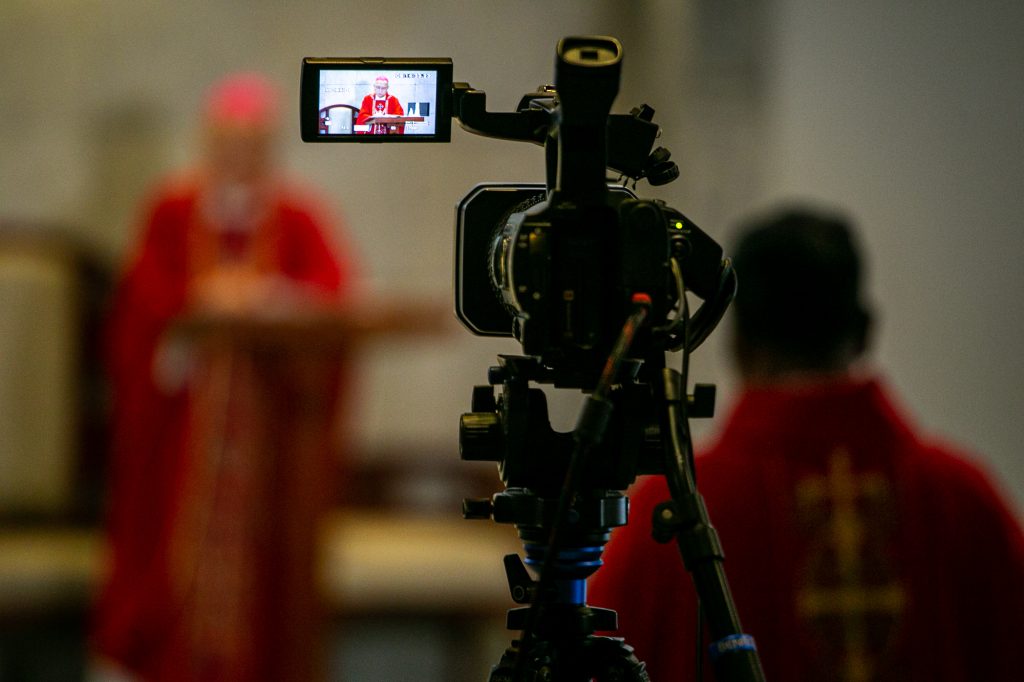I find it fascinating that the Tagalog word for eternal is WALANG HANGGAN. If we translate it literally into English, it means NO BORDERS, NO BOUNDARIES. It is supposed to be the sure gift promised by our Risen Lord’s Ascension into heaven.
The idea is that through his ascension, Christ has brought along with him our humanity into heaven. Imagine a humanity that is no longer bounded or limited by time and space!
This is what St. Paul says in 1 Corinthians 15:53, “For that which is corruptible must clothe itself with incorruptibility, and that which is mortal must clothe itself with immortality.” In Christ’s ascension, our mortal humanity is now CLOTHED WITH IMMORTALITY.
Maybe this is why the feast of the Ascension has also been declared by the Church as WORLD COMMUNICATIONS DAY. Communication is made possible only by our capacity to go beyond borders, to be able to get in touch with each other.
We know that in this world there are a lot of things that prevent us from being able to communicate with one another. These obstacles used to be mainly physical. When some people decide to migrate to other countries, for example, they get distanced from their families, communities and home countries by mountains, seas and oceans, or by dividing walls or boundaries that cannot be crossed.
There are also the obstacles of language, economic status, religious, cultural, political, and ethnic affiliations. All of these can also serve as blocks to mutual understanding among people. They can even cause wars and conflicts among nations. Example is what is presently happening between the Israelis and the Palestinians in the Holy Land.
Because we are by nature social beings, we suffer when we get alienated from each other, when we are unable to communicate with one another. We are challenged therefore to invent new and better ways and means of communication. And if there is one aspect of human life that has advanced considerably in just the past few decades, it is the technological means for social communications.
It was not long ago that Filipinos started migrating to other countries in search of jobs. We used to call them OCWs (Overseas Contract Workers). The C (contract) was eventually changed into F (Filipino), because many of them migrate and work abroad even without contracts or legal papers. These are our fellow Filipinos working overseas who are separated from their loved ones.
Imagine what it must have been like for OFWs back in those times when smartphones did not yet exist? Their only means of communicating was through traditional handwritten letters that took weeks to arrive. They had to content themselves with the snail mail because they could not afford the overseas long distance calls.
Those were the days when families would send voice taped messages to help their husbands endure the pain of homesickness. It was also within my generation that communication switched from wired to wireless technology.
Everything else suddenly changed when the internet was invented and the old-fashioned land line telephones started to become irrelevant. And when we discovered the ease of sending letters electronically we also replaced snail mail with e-mail, and then came text messaging.
Within my own generation, we witnessed the switch from analogue to digital technology, which revolutionized social communications. Even “emailing” is now gradually being replaced by “messaging” and group chats. Even the print and broadcast media also started to get either displaced or absorbed by the social media — FB, Twitter, Instagram, etc. Now we can communicate with anyone anywhere in the world using all sorts of applications like Viber, FaceTime, Zoom, GoogleMeet, etc. And we can do it right on our smart phones, tablets and laptops. As long as we have access to the internet, we can can easily go online and communicate.

But have you ever wondered why, despite the mind-boggling advancement in digital technology and the means for social communications, the conflicts, tensions and wars have not diminished? Isn’t it ironic that the same social media that revolutionized communication are serving also as means for miscommunication, as tools for sabotaging elections, for controlling public opinion, for character assassination, for scams and fraudulent activities, for the peddling of lies and fake news?
You see, communication is not just about technology. It is more about the basic good will to rise above the obstacles to reach out to one another in dialogue in order to achieve mutual understanding.
Ascension is about the risen Lord teaching us how to go beyond the borders and limits. He takes our humanity up to higher grounds to enable us to reach one another. Take note of the mandate Jesus has left his disciples, “Go out into the whole world and tell the good news to every creature.” Jesus expects us to be able to communicate the good news, not just to fellow human beings but to all creatures!
To facilitate communication in the world, St Mark in today’s Gospel tells us he empowers us to “learn new languages.”
In the story of Pentecost, the new languages are symbolized by “tongues of fire,” the gift of speaking the language of God, which is LOVE.
Only love enables us to truly communicate with one another so that we are able to go beyond the gaps of age, social status, religion, political views or economic background.
Sa pamamagitan ng lenggwahe ng malasakit natututuhan ng tao na makipag-usap kahit kanino. Walang balakid sa taong nagmamahal. Natututo tayong gumawa ng bokabularyo at sariling grammar para makipag-ugnayan at magkaintindihan.
With love, we are able to understand where the others are coming from, why they think and act the way they do. We get to realize that no one among us is by nature evil. But anyone of us are can be possessed by evil and its malevolent spell.
Ascension therefore empowers us to drive out the demons that infect us spiritually. These demons behave like the vicious COVID-19 virus strains that can cause not just a loss of smell and taste but also a loss of common sense, of understanding, respect, care and compassion.
Finally, through his ascension, Jesus teaches us how to handle the “serpents” that mislead us or confuse our communications. Remember that “serpent” figure in the Creation story, who seduced Adam and Eve with lies and half-truths? The Lord also assures his disciples that we will be able to take the deadly poison that they bring to our communications and will not be harmed.
Ascension empowers us to take even the toxic language of those who hate us and utter all sorts of slander against us without being harmed. It gives us the antidote for the poison of evil and the spiritual vaccine for the virus of violence and malevolence. That gift is what we will celebrate next Sunday: Pentecost, the coming of the Spirit of truth. It is what he meant when he said “In a little while you will not see me, but in a little while you will again see me.”
This is the Homily for Ascension Sunday, May 16, 2021, of Bishops Pablo Virgilio David of Kalookan









